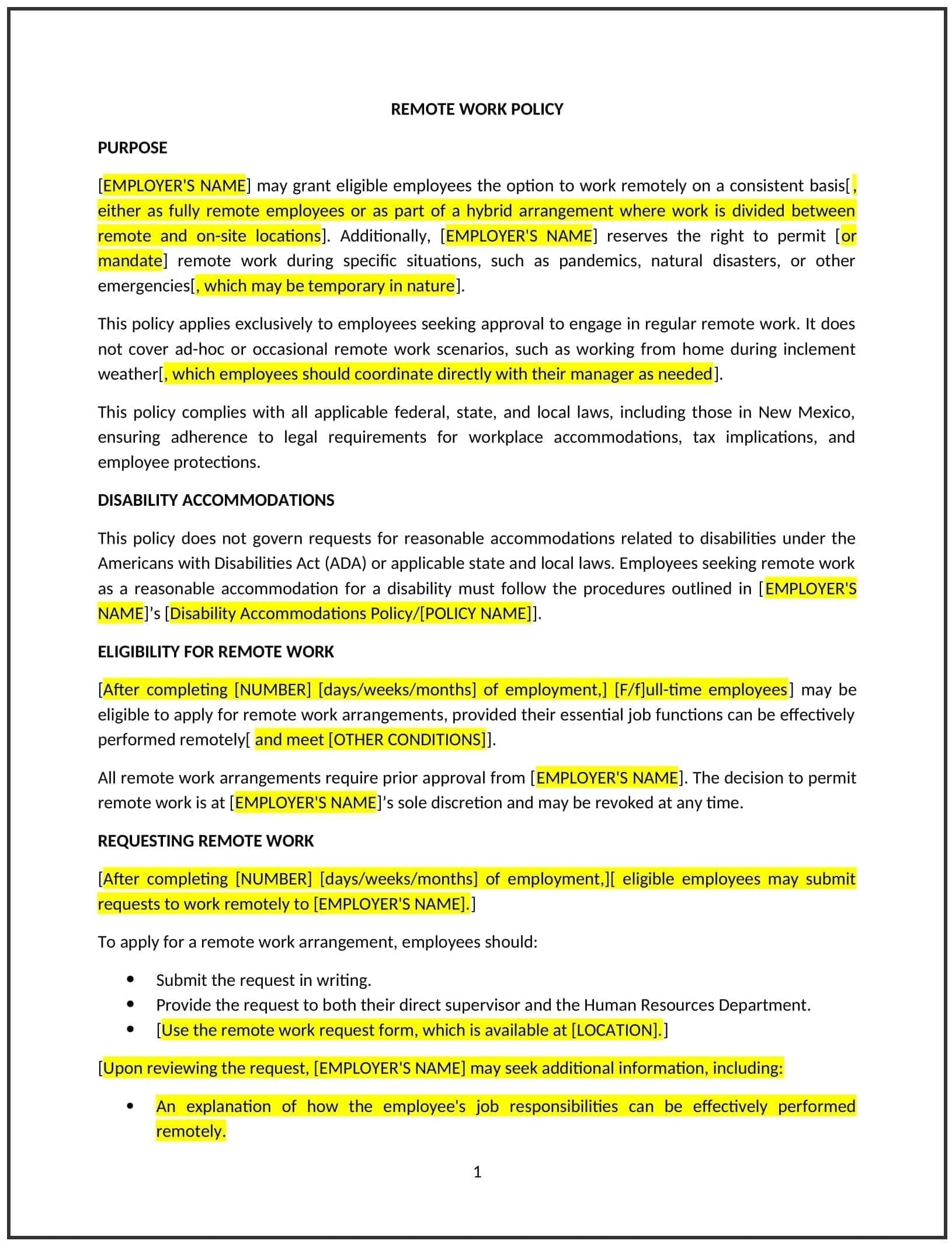Got contracts to review? While you're here for policies, let Cobrief make contract review effortless—start your free review now.

Customize this template for free
Remote work policy (New Mexico)
This remote work policy is designed to help New Mexico businesses manage employee work arrangements when working outside the traditional office setting. The policy outlines the expectations, responsibilities, and guidelines for employees who work remotely, including communication protocols, work hours, performance standards, and security requirements.
By adopting this policy, New Mexico businesses can support remote work arrangements, improve employee work-life balance, and maintain productivity while ensuring that business operations continue smoothly.
How to use this remote work policy (New Mexico)
- Define remote work: Clearly define what constitutes remote work, including whether employees can work from home full-time, part-time, or on a hybrid basis.
- Set eligibility criteria: Specify the criteria for employees to be eligible for remote work. This may include role-specific requirements, job performance, and length of service.
- Establish communication protocols: Outline how employees working remotely should communicate with their teams, including expectations for availability, response times, and preferred communication tools (e.g., email, video calls, messaging platforms).
- Define work hours: Specify the expected work hours for remote employees, including core hours when employees are expected to be online and available for collaboration. If flexible hours are allowed, explain how employees can adjust their schedules.
- Address equipment and security: Clearly state the business's expectations regarding the use of company equipment, such as laptops or phones, and how employees should maintain security for sensitive data when working remotely.
- Reflect New Mexico-specific considerations: Include any state-specific labor laws or regulations related to remote work, such as worker's compensation, tax implications, or specific industry rules.
Benefits of using this remote work policy (New Mexico)
Implementing this policy provides New Mexico businesses with several advantages:
- Increases flexibility: Offering remote work options can help businesses attract and retain top talent by providing employees with greater flexibility in balancing their work and personal life.
- Enhances productivity: Remote work can reduce commuting time and distractions in the office, leading to increased productivity for employees who thrive in a home office environment.
- Expands recruitment opportunities: A remote work policy enables businesses to hire employees from a broader geographic area, including those who may be located in other parts of New Mexico or beyond.
- Reduces overhead costs: Allowing employees to work remotely can help businesses reduce costs related to office space, utilities, and other in-office resources.
- Promotes employee well-being: Providing remote work options can contribute to improved employee morale and work-life balance, leading to greater job satisfaction and retention.
Tips for using this remote work policy (New Mexico)
- Communicate the policy clearly: Ensure that all employees understand the policy, including their rights and responsibilities when working remotely. The policy should be included in the employee handbook and reviewed during onboarding.
- Set clear expectations: Clearly define performance expectations for remote employees, including deadlines, deliverables, and communication standards. Regular check-ins with managers can help ensure that remote employees are staying on track.
- Provide the right tools: Ensure that remote employees have the necessary tools and resources to perform their jobs effectively, including access to collaboration software, secure VPNs, and any required equipment.
- Foster a sense of connection: Encourage remote employees to participate in team meetings, virtual social events, and other opportunities to connect with colleagues and maintain a strong team culture.
- Address performance concerns: If performance issues arise, address them promptly with clear communication and support to ensure that remote work arrangements remain effective.